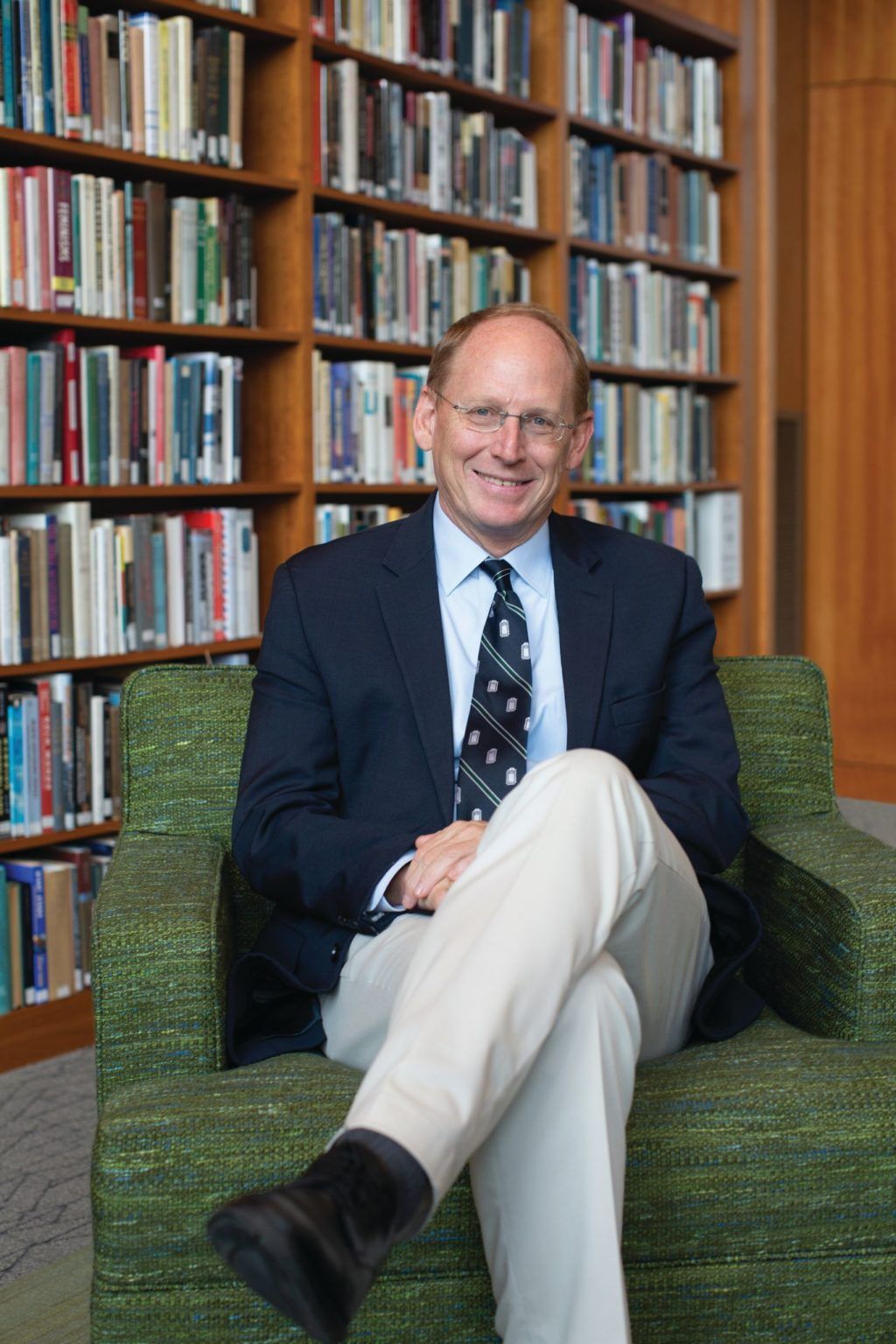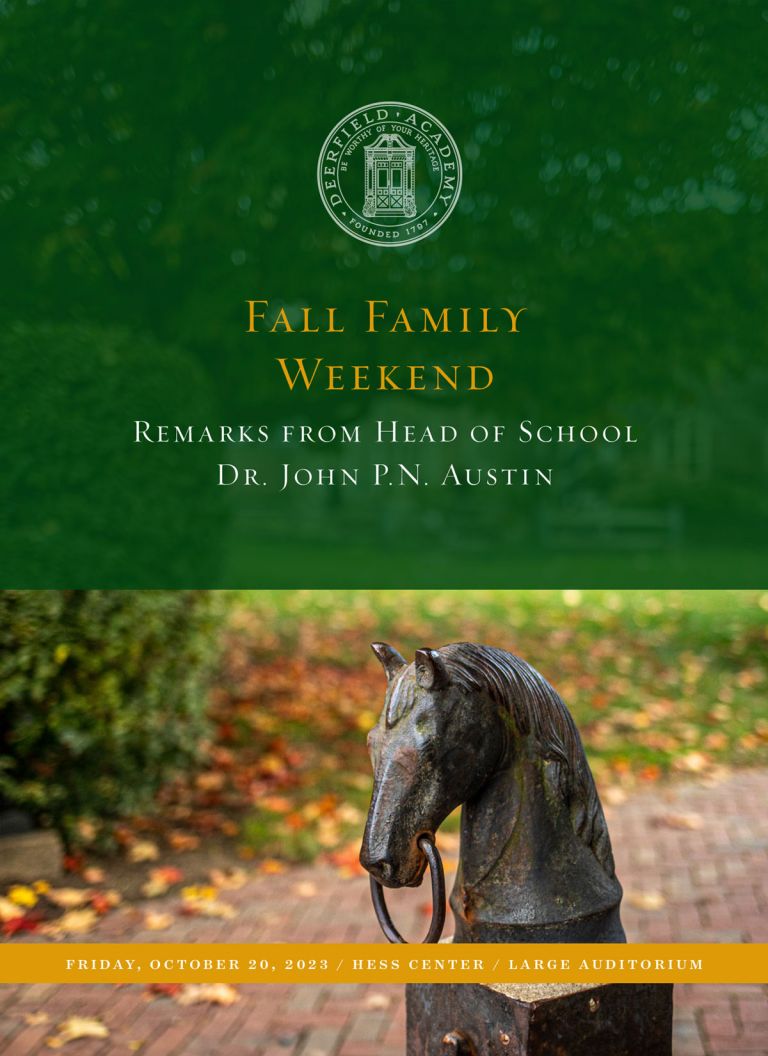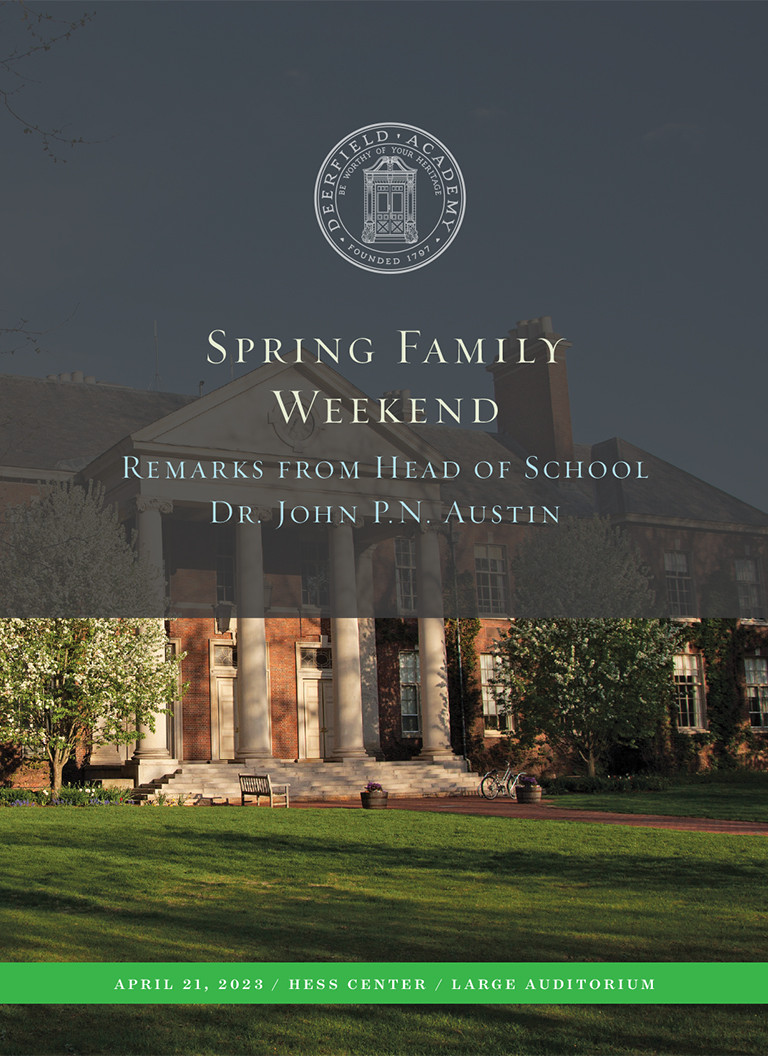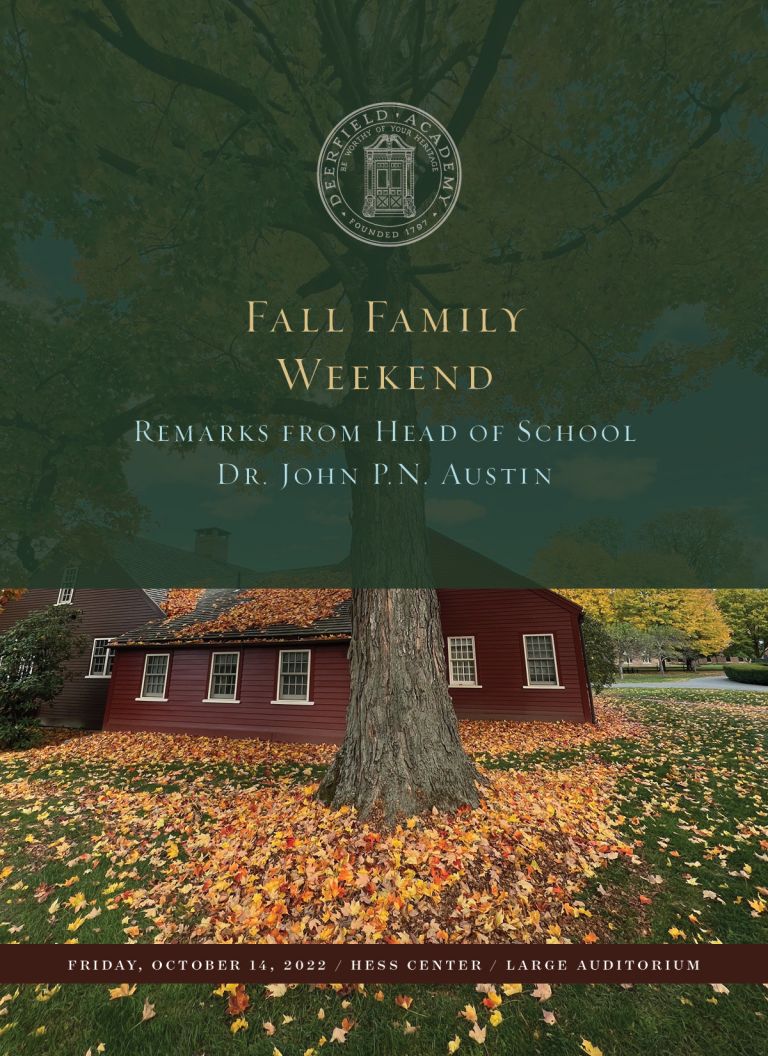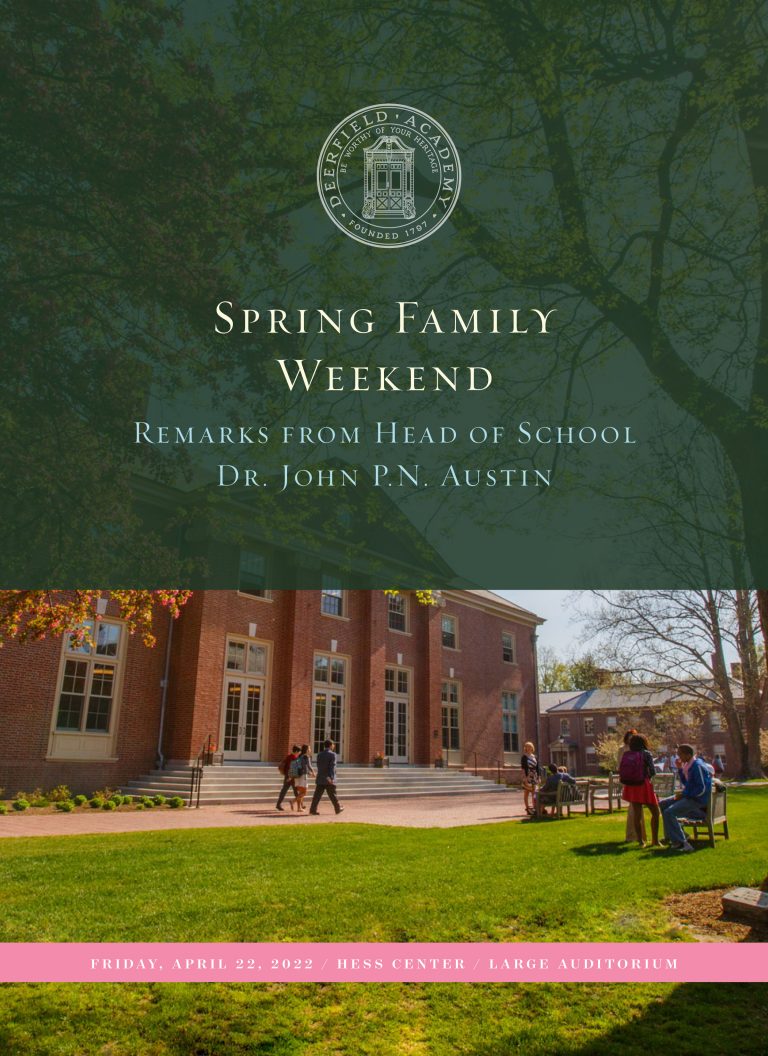We gather today to mark the beginning of a new school year, to honor all of those who have come before us and made the opportunity of this school possible, and to celebrate the promise of Deerfield.
As it is the beginning of school, I thought I would begin my remarks by taking us to the Boyden Library. I’ve spent some early mornings there recently, preparing for the school year, and it’s fast becoming one of my favorite spots. I sit in the reading room to the side at a small table, under the watchful portrait of Mrs. Boyden.
As many of you know, Mrs. Boyden was one of Deerfield’s most admired and longest serving members of the faculty, having perhaps the longest tenure of any teacher in independent school history—an extraordinary 63 years.
Each morning I walk by her portrait, and each time, Mrs. Boyden’s eyes—direct and expectant—catch my own; as I move, so too do hers. And not simply her eyes. Her entire person and attitude seem, strangely, to shift and pivot as I pass. Wherever I step, her eyes follow. It’s both unnerving—’Be careful, young man,’ she seems to say—and reassuring.
That illusion of animation, that shift of her posture—the way she seems to turn toward me—captures something essential about Mrs. Boyden, something enduring about the art of teaching—the attitude of great teachers and what Deerfield teachers have always done.
‘A teacher never teaches,’ she once wrote.
Does that strike anyone here as odd?
‘A teacher never teaches.’
That can’t possibly be true.
We know from her students that Mrs. Boyden was not just a great teacher, but a transformative one. And what, after all, is a teacher supposed to do—except teach?
But let me complete her thought. ‘A teacher never teaches,’ Mrs. Boyden writes, ‘All she can do is direct you so that you might learn.’
This is most striking, most wise—and worth considering.
Some history: Mrs. Boyden began her career in the early years of a new century, at a moment when the world was changing—in ways that are not unlike today. Across the globe, great migrations were underway—from farms to cities, from the east to the west, and to the shores of this country. The economy lurched amidst technological transformation and disruption. Stirrings of a broader civil rights movement were underway as immigrants, women, and African-Americans stood up, demanding to be heard—testing our democratic institutions. The population swelled, particularly the population of young people, and new schools—larger in scale, impersonal in character—emerged to accommodate these changes. These new schools prized efficiency, and in form resembled the industrial structures they were intended to serve. Teaching, in these schools, was largely didactic, rote, and authoritarian.
At the same time, a new vanguard of educators and scholars like William James, John Dewey, and W.E.B. Du Bois emerged to challenge this pinched, narrow view of education, insisting that learning is a quest for self-discovery and mastery—and that schooling should be directed to the full flourishing of human potential, freedom, and autonomy.
Enter Mrs. Boyden, who, even though she may not have read these scholars herself, somehow seems to have breathed in—and given life to—the spirit of their ideas.
To her, education was not a commodity or a transaction—nor was it meant to be a servant of the new industrial order. It was a gift: something offered by a teacher and graciously accepted—and returned in kind—by the student. She envisioned teaching as a dynamic, creative relationship between teacher and learner—an inspired collaboration.
There is, however—for you, our students—a catch: no matter how skilled and committed your teacher may be, there is no guarantee that you will learn. That is the arresting paradox at the core of Mrs. Boyden’s philosophy. A teacher, remember, never teaches; a teacher directs.
Mrs. Boyden says to her students—as we say to you each year: The responsibility to learn is yours. You make your education. You give it shape and animating force. And in the end, the performance is entirely your own. Learning is nothing if not participatory. This explains the expectation I see in Mrs. Boyden’s eyes. It is the expectation that we will be attentive, alert, engaged, active, and creative in pursuit of learning.
This view of education is demanding, challenging, yes, but also empowering; it honors—it absolutely requires—your individuality, your voice, your energy, and your imagination.
That was the progressive, empowering turn in Mrs. Boyden’s philosophy. In this way, she was a pioneer, an innovator—even, in her day, a radical. This was Mrs. Boyden’s great contribution to Deerfield, to us, her fellow teachers, and, to you, our students.
In contrast, it is well known—even notorious—that Mr. Boyden had little interest in classroom instruction. Here is how the great writer and Deerfield graduate John McPhee describes Mr. Boyden’s 1902 science class in the exacting discipline of physical geography: “He used to take a rock into class with him, set it on his desk, and tell his students to write everything they could about the rock.”
I could be wrong, but I suspect that this is no longer a recommended instructional practice at the Academy.
Mr. Boyden seems the very opposite of his wife, yet he was no less radical, and what he did in his own sphere—our school meetings and sit-down meals, the many shared experiences that fuel Deerfield’s unique and powerful spirit—was marked by genius, and it was every bit as innovative as Mrs. Boyden.
His view of learning was founded on the primacy and importance of human relationships. To him, learning was experiential. It happens across the full range of school settings and, most importantly, by our immersion within community—a community where we have defining obligations to one another, where friendships are deep and enduring and full of joy. To Mr. Boyden, learning derives from what we do together—and by what we do with and for others.
That is why Mr. Boyden embraced the village and town of Deerfield as an essential part of the Academy. That is why he welcomed to Deerfield students who were shunned at other schools—often for reasons of religion and ethnicity. That’s why he pioneered affordability long before it was a common practice, famously asking families to simply ‘pay what you can.’ He understood, intuitively, the power of a diverse student body to deepen learning, and he anticipated the intellectual and social benefits of an inclusive community, albeit in a way that was necessarily circumscribed by the time in which he lived.
The importance of connection and community is manifest everywhere in the Deerfield of today. Steadily and with intention, those who succeeded the Boydens took inspiration from their spirit of innovation, deepening existing commitments and building outward from them to pioneer new initiatives. These leaders—leaders like Mr. Kaufmann and Dr. Widmer, who are here with us today, and my friend and predecessor Dr. Curtis—pushed Deerfield to embrace coeducation; they championed the arts, global experience and learning, and more purposeful forms of civic engagement and service. Together they secured the resources necessary to extend and expand the financial access that Mr. Boyden pioneered and prized. These are extraordinary accomplishments—ones that will echo into the future and touch generations to come.
The Boydens understood the kind of school that was needed for their times; we must discover anew, together, the kind of Deerfield that is needed for ours.
We live during a particularly challenging moment for schools, one marked by a hostility to long-standing educational values, a skepticism about the worth of the intellectual life, and a mounting distrust of institutions of learning. It is all too common to hear science, scholarship, and expertise dismissed. Our public discourse is sometimes marked by an intolerance for complexity, the expression of uncertainty or nuance. Each of these trends is deepened by the balkanization of our civic life, economic stratification, xenophobia, and a corrosive suspicion of others. All too often, invective substitutes for dialogue, drowning critical reflection, collaboration, and compromise—in my view, the only resources we possess for solving the urgent problems facing us.
What is one school to do in the face of such challenges? How are we to meet them?
We meet them by remembering the powerful relationship between learning and citizenship. As an expression of a young country’s most noble civic ideals, Deerfield was founded in 1797 on the idea—again, entirely new for its day—that there is a powerful relationship between what students do in school and how they express citizenship and service in the future. We must stay true to that great experiment.
We meet these challenges through our continued commitment to access and affordability—ensuring that we are ready to enroll students from across this valley, this nation, and the world—now and in the future, knowing that our greatest educational resource is a dynamic, diverse, creative student body.
We meet these challenges by insisting on the unique and irreducible power of secondary education—not as a means to an end and not as mere preparation—but in itself precious and defining—and by recognizing that the years of high school are, at their best, years of wonder and formation, where the contours of character and judgement are indelibly defined and where the sustaining habits of curiosity, creativity, and joyful exploration come to life.
We meet these challenges as Deerfield has always met—by empowering our students to discover their best selves, to lead, and to actively shape a school culture that is kind and inclusive—one that stands as an inspiring rebuke to the small-mindedness and pettiness that sometimes characterize our public life.
We affirm the scholarly virtues of thoughtfulness—by asking questions, by thinking well and carefully, by listening actively and deeply, by reading—critically, appreciatively, attentively—by opening ourselves up to new and divergent points of view.
To meet the challenges and opportunities of a future we cannot predict or fully anticipate, we must seek to renew and invigorate the liberal arts as a lasting source of wisdom. We must seek to open a dialogue with the world; engage deeply with those mission-minded colleges and organizations that share our educational aspirations; and test our own ambitions against the experience of our alumni and those who understand the challenges that await our students so that our graduates are ready and fully prepared for the future. We must have the courage and the openness to recognize that there is always more to learn—even for a school as remarkable, distinctive, and strong as Deerfield.
In her portrait, Mrs. Boyden stands in front of John Williams house, a deep blue plaid overcoat draped across her shoulders. She is framed by two flowers. They are in bloom; perhaps it is spring. She holds in her clasped hands—the very center of the portrait—what appear to be some student papers and a class roster. I imagine that she is on her way to class, as we are, in a certain way, today.
I have been fortunate to have had many Mrs. Boydens in my life. In those generous and expectant eyes, I see a bit of my own mother, my first and most formidable teacher, a lot of my wife, Ms. Matouk, and something of all of the teachers who have made a difference to me, some of whom are here today—Mr. Stegeman, Mr. Speers, Mr. and Mrs. Roach.
Mr. Taylor, Ms. Lapachinski, Kareena, Irvin—thank you for your warm welcome. Tad—thank you for your kind words, but most of all for your example and friendship, and thanks to my entire St. Andrew’s family for being here. Mrs. O’Brien—thank you, those many years ago, for taking a chance on a very unprepared, semi-literate 13- year-old. Thank you to my family for their love and support.
I thank and I recognize all of the educators, from the valley and beyond, for joining us today in this celebration of the Academy and for your work with children and your service to our schools and colleges.
Thank you, Brian, for that generous introduction. Along with Brian, I want to thank the search committee, and the entire Board of Trustees for the trust, responsibility, and confidence that you have placed in me. Your dedication to this school and your tireless service inspire me—and all of us.
The values of Deerfield—its expansive vision of what a school can be—are not only essential and necessary—they are enduring. Let us preserve, extend, and deepen those values; let us seek renewal in the spirit of those who have come before; and let us do this together, and with strength of purpose, so that we may be worthy of this remarkable school.
I wish all of us a great year of learning. Thank you.

